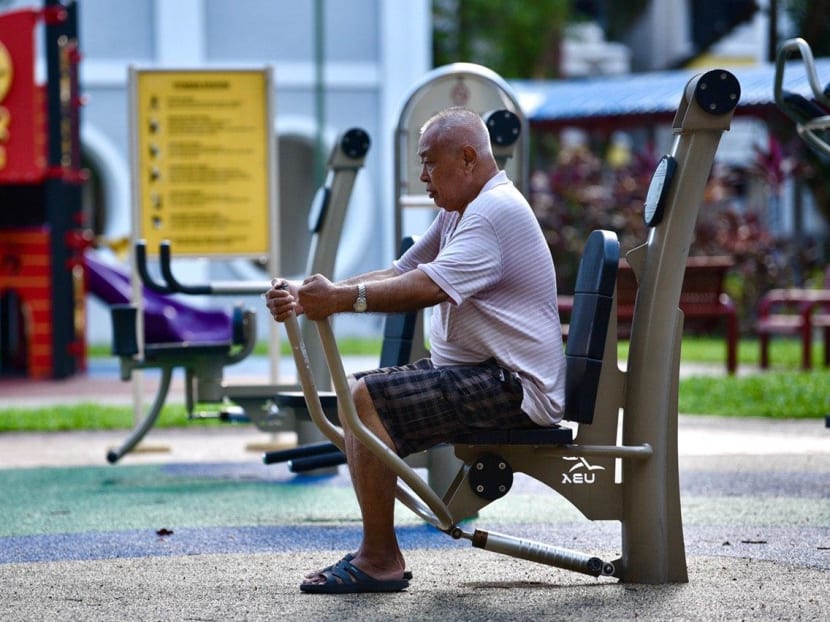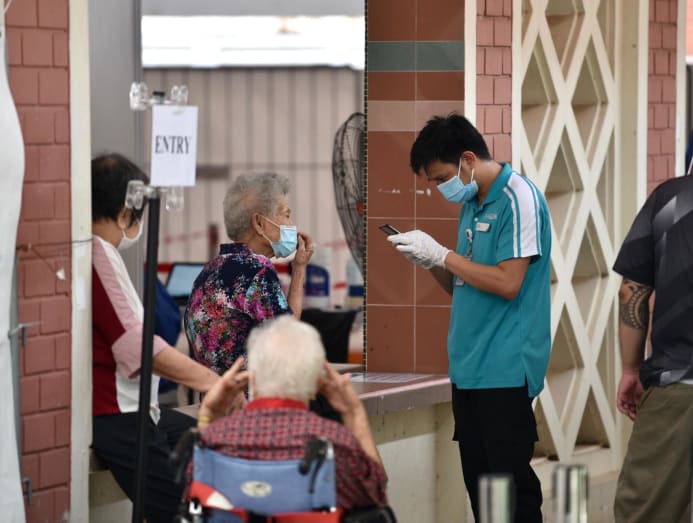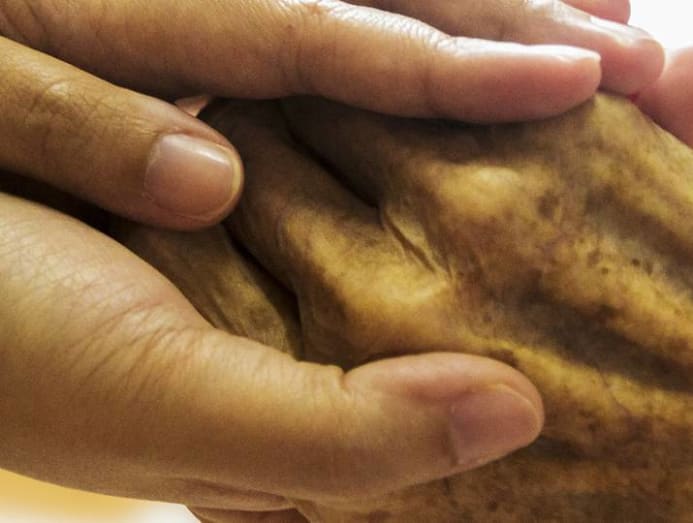Commentary: Unkind COVID-19 related comments targeted at the elderly are counter-productive
When an older person doesn’t wear a mask properly or resists vaccination, understanding and education go a much longer way than ageist remarks, says SUSS’ Sng Hock Lin.

An elderly man gets a morning workout at a fitness corner in Toa Payoh on Jun 19, 2020, the first day of Phase 2 of Singapore's reopening. (Photo: Jeremy Long)
SINGAPORE: Redhill and Bukit Merah have been attracting attention for the wrong reasons recently with its COVID-19 clusters. Some residents are also seeing red and pointing their fingers at senior citizens for not adhering to safe management measures (SMM).
They have gone online with comments like “Hope this unpleasant episode will instill those STUBBORN people in BMV (Bukit Merah View) areas especially the elderlies to wear their mask and wear it properly!”, “Fine all those old folks! All mask down. We cannot be too unkind.”, and “If u happen to see old people removing their mask to spit, cough and sneeze in this area, you would know the growth in size of this cluster is not going to stop here.”
The anxiety of these writers, like many of us, on the development of clusters is understandable. But generalised comments directed at the behaviours of these older adults and the negative stereotyping can be unhelpful.
As much as we try to curb the spread of the virus in Singapore, we should also be cautious of the proliferation of such blame culture against older adults.
READ: Commentary: An elderly public housing project is a game-changer but mindsets still need shifting
After over a year of coping with this pandemic, there is a very real pandemic fatigue. The inability to live life normally – travel, work, socialise - has led to increased tensions among people resulting in some very unfortunate acts of rebelling against SMM rules, racist remarks and now, ageist comments.
But why are older adults not adhering to safe measures?
Recently, I spotted an old man whom I thought was not wearing his mask properly because it was drooping below his lips. As I was about to go forward to “teach” him how to put on his mask, I noticed that he has only one ear – which could not secure the mask well. That encounter taught me to suspend my judgement.

What may be clear breaches of pandemic protocols to our immediate eye, may be inadequacies the elderly face which are less visible. One of them could be dementia, which causes decline in memory, thinking and reasoning skills, as well as affecting simple daily tasks such as wearing masks.
A lot of the online comments are about old folks gathering to meet friends when there are limits. The bulk of these people are retirees and have to kill so many painful hours a day.
We cannot excuse breaches of the law – but when you encounter someone like that, put on your compassion hat to take the time to explain to them the importance of adhering to SMM.
Empathetic understanding of older adults and the effects of ageing would allow us to better appreciate them especially with increased life expectancy, demographic changes and generational differences in our society.
READ: Commentary: You don’t have to age and grow frail alone. Nurses have your back
Age, gender and race are the three primary dimensions of social categorisation. Ageism is the third “ism” after racism and sexism. Age is the single category that every living person potentially joins.
Yet, resistance to SMM and inability to adapt during the pandemic are not age specific.
Recent examples of people flouting SMM also involve those younger, including a 39-year-old foreigner who allegedly caused public nuisance and did not wear a mask on the MRT; and a 41-year-old woman who also refused to wear a mask and caused a commotion at a market during last year’s “circuit breaker” period.
Also, no one is perfect. I have caught myself forgetting to wear a mask when I step out of home, only to scuttle back quickly to pick one up.
CONSEQUENCES OF AGEISM
Studies show that many people internalise negative stereotypes of becoming old – they believe they will be more forgetful, sickly, and depressed – and they anticipate this will be their experience.
These beliefs can then become self-fulfilling. We often hear people as young as in their mid-40s making self-defeating statements like “My legs won’t be able to take long distance walk” and “I can’t jump or squat at this age” etc, instead of exercising to build their lower body muscles so that they could beat the negative stereotypes.
We also often associate older people with poor memory and inability to learn new technology. This is also not entirely true. Haven’t we heard many stories of lifelong learners?
Think of the world leaders who are past retirement age – President Joe Biden is an example – he and others like him have grueling schedules that would put many young people to shame.
Prevalence of ageism in the US has been noted in children as young as four. So, education regarding ageing-related topics could serve as a curricular intervention. Such an intervention could improve both knowledge and attitudes since ageism may result from an individual’s lack of understanding of ageing.
READ: Commentary: It is high time for a Ministry on Ageing Issues

Beyond school, such education could be extended to the general public and future employees to combat ageism together.
I am involved in a Ageing Playfully programme with Singapore Polytechnic, where students apply design thinking knowledge and skills to create exercise programmes for older adults. Through the process, students develop empathy for the senior citizens’ physical and cognitive skills as well as form intergenerational bonds.
The Redhill episode also highlights the importance of understanding intergenerational dynamics for the benefit of our ageing society.
Some researchers have suggested exploring avenues for intergenerational contact outside the family to help us avoid the obstacle of socialised age segregation.
For instance, we could get the young and old to exercise together, we could build bigger homes so that different generations can live under one roof like before, we could get the different generations to be drivers of community engagements, among others.
READ: Commentary: If more work in old age, how relevant is the retirement age?
Such systemic changes could address the findings that people generally hold ageist attitudes towards older people in general, despite holding mostly positive views towards specific older people that they know intimately. Doing things together would allow the different generations to understand each other better.
As the responsibility of caring for an enlarged older population falls more heavily on the young, more attention and effort to establish positive intergenerational dynamics will help.
More social initiatives — such as the creation of senior volunteer groups — could go a long way in accommodating an enlarged older population.
The role of the media is also essential to portray and amplify more positive stories about older adults for example of lifelong learners, how they contribute their experience, success stories of how seniors lead seniors, serve the vulnerable and our community at large.
And the final piece of this puzzle is compassion. Studies show that compassion and ageism are linked – the higher the compassion, the lower the ageist attitudes. Because an individual’s compassion towards others is malleable through experience, programmes can be thoughtfully included in community activities – and not just one-off visits to homes.
We can be inspired by the caring society movement – Ibasho – in Japanese, which means a place where you can feel like at home, being oneself. A place where a person feels a sense of belonging and purpose resulting from social relationships associated with that place.
We can all be part of this kinder society in Singapore, not only kinder to older people but more compassionate and patient with everyone around us.
So instead of condemning, let’s pause and empathise, take the first step and show compassion, and remind our older folks to put on their masks.
As Gandhi said, “The greatness of our society is measured by how we treat our weakest”, so we can start by first understanding and then reaching out to our pioneers so we can be a better, more enlightened society.
Sng Hock Lin is pursuing his PhD in gerontology at the Singapore University of Social Sciences (SUSS). He completed his master's degree in gerontology at SUSS, where he received the Alice Lim Memorial Fund gold award for topping his cohort.





